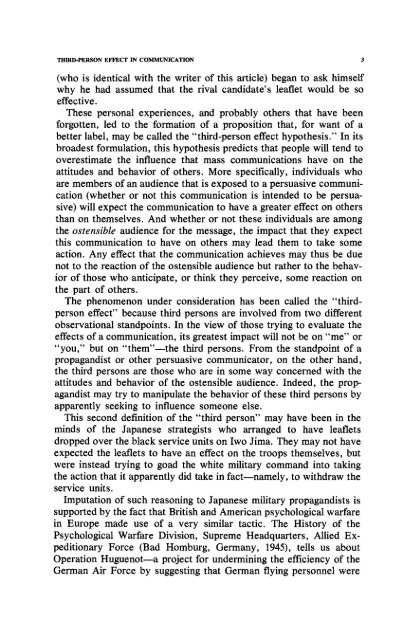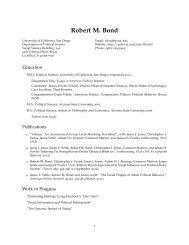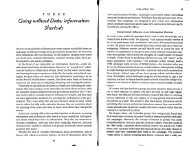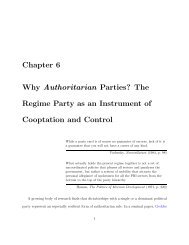The Third-Person Effect in Communication W. Phillips Davison The ...
The Third-Person Effect in Communication W. Phillips Davison The ...
The Third-Person Effect in Communication W. Phillips Davison The ...
You also want an ePaper? Increase the reach of your titles
YUMPU automatically turns print PDFs into web optimized ePapers that Google loves.
TPIIRD.PE;RSON EFFECT IN COMMUNICATION 3<br />
(who is identical with the writer of this article) began to ask himself<br />
why he had assumed that the rival candidate's leaflet would be so<br />
effective.<br />
<strong>The</strong>se personal experiences, and probably others that have been<br />
forgotten, led to the formation of a proposition that, for want of a<br />
better label, may be called the "third-person effect hypothesis." In its<br />
broadest formulation, this hypothesis predicts that people will tend to<br />
overestimate the <strong>in</strong>fluence that mass communications have on the<br />
attitudes and behavior of others. More specifically, <strong>in</strong>dividuals who<br />
are members of an audience that is exposed to a persuasive communi-<br />
cation (whether or not this communication is <strong>in</strong>tended to be persua-<br />
sive) will expect the communication to have a greater effect on others<br />
than on themselves. And whether or not these <strong>in</strong>dividuals are among<br />
the ostensible audience for the message, the impact that they expect<br />
this communication to have on others may lead them to take some<br />
action. Any effect that the communication achieves may thus be due<br />
not to the reaction of the ostensible audience but rather to the behav-<br />
ior of those who anticipate, or th<strong>in</strong>k they perceive, some reaction on<br />
the part of others.<br />
<strong>The</strong> phenomenon under consideration has been called the "third-<br />
person effect" because third persons are <strong>in</strong>volved from two different<br />
observational standpo<strong>in</strong>ts. In the view of those try<strong>in</strong>g to evaluate the<br />
effects of a communication, its greatest impact will not be on "me" or<br />
"you," but on "themw-the third persons. From the standpo<strong>in</strong>t of a<br />
propagandist or other persuasive communicator, on the other hand,<br />
the third persons are those who are <strong>in</strong> some way concerned with the<br />
attitudes and behavior of the ostensible audience. Indeed, the prop-<br />
agandist may try to manipulate the behavior of these third persons by<br />
apparently seek<strong>in</strong>g to <strong>in</strong>fluence someone else,<br />
This second def<strong>in</strong>ition of the "third person" may have been <strong>in</strong> the<br />
m<strong>in</strong>ds of the Japanese strategists who arranged to have leaflets<br />
dropped over the black service units on Iwo Jima. <strong>The</strong>y may not have<br />
expected the leaflets to have an effect on the troops themselves, but<br />
were <strong>in</strong>stead try<strong>in</strong>g to goad the white military command <strong>in</strong>to tak<strong>in</strong>g<br />
the action that it apparently did take <strong>in</strong> fact-namely, to withdraw the<br />
service units.<br />
Imputation of such reason<strong>in</strong>g to Japanese military propagandists is<br />
supported by the fact that British and American psychological warfare<br />
<strong>in</strong> Europe made use of a very similar tactic. <strong>The</strong> History of the<br />
Psychological Warfare Division, Supreme Headquarters, Allied Ex-<br />
peditionary Force (Bad Homburg, Germany, 1945), tells us about<br />
Operation Huguenot-a project for underm<strong>in</strong><strong>in</strong>g the efficiency of the<br />
German Air Force by suggest<strong>in</strong>g that German fly<strong>in</strong>g personnel were











